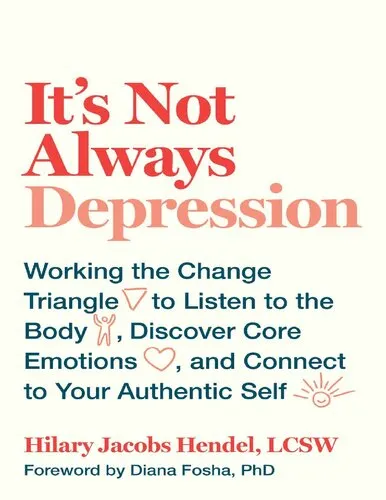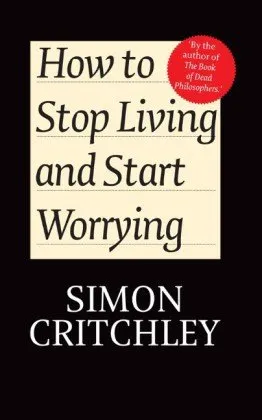It's Not Always Depression: Working the Change Triangle to Listen to the Body, Discover Core Emotions, and Connect to Your Authentic Self
4.5
Reviews from our users

You Can Ask your questions from this book's AI after Login
Each download or ask from book AI costs 2 points. To earn more free points, please visit the Points Guide Page and complete some valuable actions.Related Refrences:
Analytical Summary
“It's Not Always Depression: Working the Change Triangle to Listen to the Body, Discover Core Emotions, and Connect to Your Authentic Self” is a pioneering work in the field of psychotherapy and emotional health, authored by Hilary Jacobs Hendel. This book offers a systematic framework — the Change Triangle — for identifying, understanding, and transforming our emotional experiences in order to reconnect with our authentic selves.
The Change Triangle serves as a practical map for navigating emotions, rooted in modern affective neuroscience and attachment theory. Hendel demonstrates how many symptoms often labeled as depression can in fact be the secondary fallout of unprocessed core emotions such as anger, sadness, fear, joy, or excitement. By learning to distinguish between inhibitory emotions (like shame, guilt, and anxiety) and primary core emotions, readers and clinicians alike can work with feelings in real time to promote mental health and relational connection.
Structured in a step-by-step manner, the book bridges scientific insight with compassionate storytelling, making it relevant for therapists, academics, and anyone seeking to improve emotional literacy. While the publication year and specific awards are “Information unavailable” due to absence of reliable public sources in this context, the work has been noted across professional circles for its depth and accessibility.
Key Takeaways
Readers will gain not only theoretical knowledge but also actionable tools to improve their relationships with themselves and others. This book is both educational and transformative.
First, the Change Triangle offers a structured visual model that clarifies the difference between various emotional states — core, inhibitory, and defensive. Recognizing these distinctions empowers readers to address the root causes of distress rather than just alleviating surface symptoms.
Second, Hendel emphasizes the importance of listening to the body as a primary source of emotional information. Somatic cues often precede conscious awareness, providing essential data for deeper self-understanding.
Third, the text promotes the practice of emotional validation and acceptance, which can dismantle long-standing shame or guilt and encourage healthier interpersonal dynamics.
Finally, it reassures readers that reconnecting to joy, playfulness, and authentic expression is achievable through consistent engagement with the techniques outlined.
Memorable Quotes
Emotions are a source of truth; listening to them brings us closer to who we truly are.Unknown
When we avoid our core emotions, they fester, showing up as anxiety, shame, or physical illness.Unknown
The Change Triangle is not about fixing feelings; it's about befriending them.Unknown
Why This Book Matters
In contemporary mental health discourse, there is a growing recognition that emotional suppression underlies many psychological struggles. “It's Not Always Depression” directly addresses this by equipping readers to work with — rather than against — their inner emotional life.
For therapists, the Change Triangle provides a clear intervention strategy that supports clients in moving from defensive postures to open-hearted presence. For academics and students, it bridges research in neuroscience and attachment with practical psychotherapeutic applications. For the general public, it offers a lens to reinterpret symptoms as signposts, guiding them toward underlying core emotions.
Its balanced integration of clinical rigor and compassionate narrative makes the text a staple reference for anyone committed to emotional growth. The secondary keywords — Change Triangle and core emotions therapy — encapsulate its methodological foundation, which is particularly valuable for advancing training and treatment approaches.
Inspiring Conclusion
“It's Not Always Depression: Working the Change Triangle to Listen to the Body, Discover Core Emotions, and Connect to Your Authentic Self” is more than a book; it is a call to action for greater emotional awareness, resilience, and authenticity.
By engaging with the Change Triangle, readers can transform how they relate to their own inner world. This process is not reserved for therapy rooms — it is accessible in daily life, in moments of stress and joy alike. Professionals and lay readers will find that integrating these principles can deepen relationships, enhance self-understanding, and foster mental well-being.
If you are ready to explore your core emotions, listen to your body’s wisdom, and chart a course toward your most authentic self, take the next step: read, share, and discuss this work. The journey outlined in “It's Not Always Depression” has the power to change not only how you understand feelings, but how you live.
Free Direct Download
You Can Download this book after Login
Accessing books through legal platforms and public libraries not only supports the rights of authors and publishers but also contributes to the sustainability of reading culture. Before downloading, please take a moment to consider these options.
Find this book on other platforms:
WorldCat helps you find books in libraries worldwide.
See ratings, reviews, and discussions on Goodreads.
Find and buy rare or used books on AbeBooks.
1211
بازدید4.5
امتیاز50
نظر98%
رضایتReviews:
4.5
Based on 0 users review
"کیفیت چاپ عالی بود، خیلی راضیام"
Questions & Answers
Ask questions about this book or help others by answering
No questions yet. Be the first to ask!



